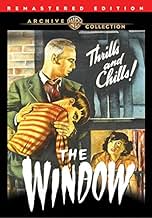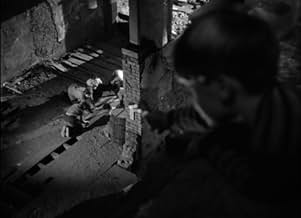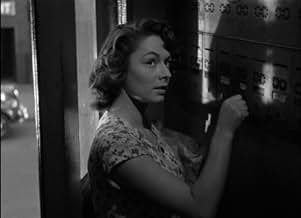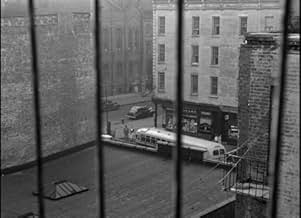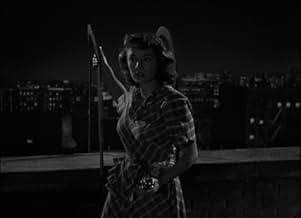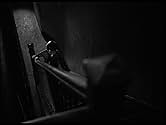Um der Hitze einer schwülen Sommernacht zu entgehen, beschließt ein 9-jähriger Junge aus Manhattan, auf der Feuerleiter zu schlafen, und wird Zeuge eines Mordes, aber glaubt ihm.Um der Hitze einer schwülen Sommernacht zu entgehen, beschließt ein 9-jähriger Junge aus Manhattan, auf der Feuerleiter zu schlafen, und wird Zeuge eines Mordes, aber glaubt ihm.Um der Hitze einer schwülen Sommernacht zu entgehen, beschließt ein 9-jähriger Junge aus Manhattan, auf der Feuerleiter zu schlafen, und wird Zeuge eines Mordes, aber glaubt ihm.
- Regie
- Drehbuch
- Hauptbesetzung
- Für 1 Oscar nominiert
- 5 Gewinne & 3 Nominierungen insgesamt
- Murdered Seaman
- (Nicht genannt)
- Cop Carrying Stretcher
- (Nicht genannt)
- Police Officer
- (Nicht genannt)
- Police Officer
- (Nicht genannt)
- Police Officer
- (Nicht genannt)
- Police Officer
- (Nicht genannt)
- Observer at Scene
- (Nicht genannt)
- Police Officer
- (Nicht genannt)
- Stranger on Street
- (Nicht genannt)
- Police Officer
- (Nicht genannt)
- Detective Ross
- (Nicht genannt)
Empfohlene Bewertungen
This is a very real film, in that we all know children who 'fabricate' as easily as they breath. Bobby Driscoll was superb. I've never seen his Disney work -- now I'll keep my eye out for his name.
I loved seeing a younger Arthur Kennedy (before he played only drunks) and a plain but always pretty Barbara Hale (pre-Perry Mason). Both were excellent and demonstrated a range I never gave them credit for.
His parents (Arthur Kennedy and Barbara Hale) warned him he must stop his fantasies and what followed was a classic up-dating of the boy who cried 'wolf' once too often
One stifling night, the boy climbed out on to a fire escape to seek cool air and, through a crack under a window blind, he witnessed a murder
He knew no one would believe him although this time, for the first time, his story was true He tried to tell his mother that he had seen a couple called Kellerson trying to rob a drunk and killing him in a fight: the boy got scolded for his imagination and sent to bed His father locked him in for punishment; the boy escaped and took his story to the police station. A detective investigated, but could find no body, no signs of a struggle
Now the awful irony: the guilty Kellersons learn through the detective that the boy had seen them committing the crime, and the boy's parents, with terrifyingly understandable logic, send the boy to the killers to apologize 'for spreading such an awful story about them'.
The Kellersons cannot decide: should they leave well alone, as nobody believes the boy; or should they commit another crime to cover the first?
'The Window' is a classic little second feature, entertaining and suspenseful; unfortunately it had few successful imitators
The build up to the crime is considered, we are privy to Tommy's home life in a cramped New York tenement, his parents loyal and hard working and they have plenty of love for their fanciful son.
Once the crime is committed, a shocking incident compounded by the fact it's perpetrated by a normal looking male and female couple, a destitute pairing prepared to do the unthinkable just for cash, then things get real tense and the thrills begin to roll.
Tommy is now under threat from the killers and he needs to be silenced, so as the cramp confines of the hot and sweaty tenement area are vividly brought to life via noir visuals, Ted Tetzlaff (director) and his cinematographers (Robert De Grasse & William O. Steiner) excelling, the paranoia and tension builds to the point that the gripping finale acts as a merciful release.
Very well performed by a cast that also includes Paul Stewart, Ruth Roman, Arthur Kennedy and Barabara Hale, this late 1940s noir is highly recommended. 8/10
Seeing this taut little thriller in a small western town when I was 10 not only scared the heck out of me, but influenced my perception of urban life for years to come. Seeing the film again 60 years later, I'm impressed with producer Dore Schary's insistence on the grimness of the tenements, at least by later suburban standards. There's no attempt to glamorize or even varnish the family's dingy, cramped flat. Whether on NY location or on an RKO sound stage, the lighting remains dark and oppressive. Of course, that not only heightens the noirish atmosphere, but also lends an uncommon degree of realism to the family's working- class environment. After all, Dad works the nightshift, while Mom helps with the extended family, leaving little Tommy home alone. And that, I believe, amounts to more than just a handy plot device. And get a load of the on-location ruins where the kids play at the beginning—looks like something out of post-war Europe. No wonder MGM went after Schary in an effort to become more socially relevant in post-Andy Hardy America. There may be a lot of Hollywood in the melodrama itself, but the look and feel is definitely not Hollywood of the time. What a fine little film that's still edge-of-the-seat excitement. And, if I recall correctly, I was an especially good little boy for a long time afterward.
Wusstest du schon
- WissenswertesThis film was shot in the latter part of 1947 but shelved by RKO boss Howard Hughes and released in 1949. When Bobby Driscoll got his Juvenile Oscar in 1950, he was 13 years old.
- Patzer(at around 4 mins) While running down the top flight of stairs to play with the neighbor boys, Tommy's breath is visible. His breath is visible again (at around 25 mins) while he is running to the police station, just after he runs past the canopy of 136th. This is due to shooting in the late Fall when the movie is set in the 94 degree heat of summer.
- Zitate
[last lines]
Tommy: [Tommy and his parents are in the back of a police car on the way to the police station] And that's all the truth.
Police Officer: That was some jump, son.
Tommy: Yeah, but I know one thing. I'm never gonna be a fireman. I don't like jumpin' in those nets.
Ed Woodry: I'm proud of you, Tommy. And from now on, I promise I'll believe you.
Tommy: I'm glad, Pop. And from now on, I promise I'll never make up another story.
Mary Woodry: That'll make us all happy.
Ed Woodry: I'll bet when we get down to the station, a lot of guys are going to point at me and say, "There goes Tommy Woodry's father."
[Tommy smiles and his father chuckles over a shot of his son's beaming face]
- Crazy CreditsThe role of "Tommy" played by BOBBY DRISCOLL by special arrangement with WALT DISNEY
- VerbindungenFeatured in Crumb (1994)
Top-Auswahl
Details
- Erscheinungsdatum
- Herkunftsland
- Sprache
- Auch bekannt als
- The Window
- Drehorte
- New York City, New York, USA(abandoned tenements on 105th and 116th Streets)
- Produktionsfirma
- Weitere beteiligte Unternehmen bei IMDbPro anzeigen
Box Office
- Budget
- 210.000 $ (geschätzt)
- Laufzeit1 Stunde 13 Minuten
- Farbe
- Seitenverhältnis
- 1.37 : 1
Zu dieser Seite beitragen


